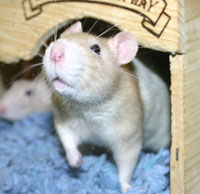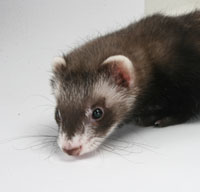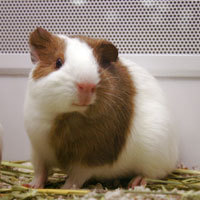 The Mongolian Gerbil, Meriones unguiculatus, is a common pet, but its life in the wild is anything but “common”. In fact, its social structure and breeding habits are among the rodent world’s most unique. Let’s take a look at what field research has revealed about this most interesting little creature. Read More »
The Mongolian Gerbil, Meriones unguiculatus, is a common pet, but its life in the wild is anything but “common”. In fact, its social structure and breeding habits are among the rodent world’s most unique. Let’s take a look at what field research has revealed about this most interesting little creature. Read More »
Category Archives: Gerbils
Feed SubscriptionThe Bedding Dilemma – Choosing the Right Bedding for Your Small Pet
Seasoned small animal owners tend to bicker over the smallest of details when it comes to the care of their pet. From food to free time, no one seems to agree on just one thing. When it comes to bedding though, there seems to be an all out war over which is best. As a small pet owner, I’ve used just about every variety of bedding on the market, and even I get confused sometimes. One will claim to have the best odor control, but it’s really dusty. Another will be softer and cuddlier for your pet sleep in, but it smells bad even when it’s clean. There is no perfect small animal bedding…but, there is probably be one that is best for your particular situation. There are pros and cons to all the small animal bedding types available. Here’s my break down on what to expect from the most popular types available. Read More »
Small Pet Health – Wet-Tail in Hamsters
 We like to keep our little pets as happy and healthy as possible, but as with our own health there are some common illnesses that can occur despite our efforts to keep them away. Wet-tail describes a common illness found to affect most rodents, but it affects hamsters more often than others, as they seem to be the most susceptible to it. The symptoms of this illness include diarrhea (characterized by a wet tail area, hence the name), a bad odor, lack of appetite, unkempt appearance (from the hamster not cleaning itself), a hobbling walk with a hunched back, and an almost total lack of energy, though this is not to be confused with a hamster’s normal daytime sleep schedule. Read More »
We like to keep our little pets as happy and healthy as possible, but as with our own health there are some common illnesses that can occur despite our efforts to keep them away. Wet-tail describes a common illness found to affect most rodents, but it affects hamsters more often than others, as they seem to be the most susceptible to it. The symptoms of this illness include diarrhea (characterized by a wet tail area, hence the name), a bad odor, lack of appetite, unkempt appearance (from the hamster not cleaning itself), a hobbling walk with a hunched back, and an almost total lack of energy, though this is not to be confused with a hamster’s normal daytime sleep schedule. Read More »
Bird Toys – Not Just for the Birds!
I’ve owned my female gray cockatiel, Charlie, for 13 years, and still I haven’t developed the knack for figuring out what toys she will love and hate. She is a very picky girl and can take weeks to even glance at any new toy I give her, let alone play with it. Needless to say, this has resulted in a lot of perfectly good bird toys being stowed away in the cabinet never to be enjoyed. I thought I was wasting a lot of money on things that Charlie didn’t even like, and decided to experiment. Read More »
Choosing the Perfect Small Pet – Take the Quiz
 Sometimes it is hard to find the perfect pet. They all look so cute sleeping in their hammocks, running in their wheels, or just snuggling with pals. So which critter should you take home from the pet store? The questions in this short fun quiz should help give you an idea of your small pet personality match, but remember to do additional research before making the final decision! You’ll find the best pets to suit your lifestyle in the answers section below.
Sometimes it is hard to find the perfect pet. They all look so cute sleeping in their hammocks, running in their wheels, or just snuggling with pals. So which critter should you take home from the pet store? The questions in this short fun quiz should help give you an idea of your small pet personality match, but remember to do additional research before making the final decision! You’ll find the best pets to suit your lifestyle in the answers section below.
1.) During my days off, you can often find me ____.
a.) Hanging out at home – whether it’s to finish the laundry or catch up on all my recorded shows!
b.) Away on a mini vacation with the family. See you Monday!
c.) Having a bunch of friends over for a cook-out. The more the merrier!
2.) How much time do I want to spend grooming my pet?
a.) As little time as possible
b.) I don’t mind a little brushing here and there
c.) I could start my own pet salon with the time I will spend grooming!
3.) How many animals do I want?
a.) Just one will do
b.) A pair of pals
c.) A whole family!
4.) I will get around to cleaning my pet’s cage ____ times a week.
a.) 1-2
b.) 2-3
c.) 5-7
5.) I prefer to _____ my pet!
a.) Cuddle with
b.) Play with
c.) Just watch
d.) Do a little of everything
 Answers
Answers
Question 1
a.) If you’re home a lot, you can spend a lot of time playing with or just watching your pets play outside the confines of their cages. Think about ferrets, guinea pigs, rabbits, or rats. These animals love interacting with their owners!
b.) If you prefer to spend as much time away from home as possible, a highly social or active animal may not be a good choice. Think about hamsters, gerbils, or chinchillas. These little guys do well without a lot of handling, but always be sure there is plenty of food and water.
c.) Have a big family or like to have lots of parties? Think about animals that are not bothered by a lot of noise and are not spooked by kids and strangers. The social ferret will want to join in the festivities while sensitive critters like rabbits and guinea pigs won’t appreciate a lot of ruckus! Then again, keeping the pet’s cage in a private room where guests or unattended children will not be entering works well for any small pet.
Question 2
a.) Hamsters, gerbils, rats, and mice are very good at keeping themselves clean, so you will not need to brush or bathe them. They also generally will not need their nails clipped since they spend a lot of time wearing them down by digging. You can, however, offer a dust bath once and a while to hamsters and gerbils now and then!
b.) If you don’t mind the occasional grooming session, most short haired rabbits and guinea pigs will need to be brushed once a week or so to remove dead hair and knots. However, if your breed of guinea pig or rabbit has long hair, you will need to do this more often. Chinchillas need no more than a roll in the dust once or twice a week to keep clean. Rabbits and guinea pigs usually need a nail trimming once a month.
c.) If you love nothing more than pampering your pet, a long haired breed of guinea pig or rabbit will require daily brushing to keep knots from building up as well as monthly nail trimming. Ferrets will need to have their ears cleaned and nails clipped once every two weeks, and can be bathed once a month if their body oil buildup becomes too smelly to handle.
Question 3
a.) Animals that do well housed alone include hamsters, chinchillas, and rabbits, but remember they will still need attention from you and plenty of toys and activities to keep busy.
b.) Chinchillas, gerbils, mice, rabbits, and guinea pigs do well in pairs but remember to get two of the same sex animal or have your animals spayed or neutered before introducing them to prevent unwanted litters. It is usually a good idea to buy pairs of animals at the same time so they can grow up already accustomed to each other.
c.) Gerbils love company! In the wild they live in small groups dominated by one female. If you opt for gerbils, think about getting males as they do not fight for dominance as much as females do. Guinea pigs also live in groups, but females tend to get along better than males do. Rabbits in the wild will live in groups until the breeding season, when the males will fight for mating rights and the females will fight for nesting areas. If you keep bunnies, be sure to spay and neuter them to eliminate these behaviors. Rats and mice live in huge colonies together in the wild, and as long as there is ample food and space, should get along well in groups at home.
 Question 4
Question 4
a.) Small rodents, like hamsters, mice, gerbils, and rats are clean and generally do not need to have their cage totally cleaned more than once or twice a week. Remember, the more animals you keep, the more they will need their cage cleaned.
b.) Guinea pigs, rabbits, and chinchillas have constantly moving digestive systems, so you can imagine the amount of poop they make in a week! If you scoop or dump their cage pans every few days and scrub the entire thing once a week, smells and bacteria will not take over your life.
c.) Ferrets are known for being messy, and they poop a LOT. Once you get them trained, their litter pans will need to be cleaned every day or every other day and the toys, towels, and hammocks will need thrown in the laundry or the smell from their body oils will build up. Along with their grooming, if you keep up on this chore it will become a trivial task, but put it off for too long and P.U.! No one wants to spend all day scrubbing cages. If you are diligent, you won’t have to!
Question 5
a.) You can’t get any cuddlier than a rabbit or guinea pig!
b.) Ferrets and rats will go crazy for playtime…literally!
c.) Hamsters, mice, chinchillas and gerbils can entertain themselves while you watch.
d.) There is a fourth category reserved here just for….everybody! Most animals will benefit from a bit of cuddling, a bit of playtime, and a bit of just being left alone, and it will depend on the personality of your individual animal. Remember that no animal perfectly fits the mold for what the general temperament is for its species. I’ve seen social hamsters and shy ferrets. I’ve seen solitary gerbils and mellow guinea pigs. Try out all of the above activities with your pet and see what he or she prefers. Read your pet’s body language and act accordingly, and do not be offended if your normally cuddly rabbit decides he doesn’t want to be picked up today. Just watch him for now. If your ferret is all tuckered out from playing, engage in a cuddle session! Whatever pet you choose, if you respect his or her boundaries, the relationship between you will flourish!
A Naturalist-Priest, Yellow Rats and Bacterial Research – The Contorted Story of the Gerbil’s (Meriones unguiculatus) Arrival in the Pet Trade
In 1862, a French missionary named Armand David was commissioned to China, ostensibly as a school teacher. However, the young priest had been deeply interested in nature since childhood and, as naturalists are want to do when finding themselves in exotic (or familiar!) locales, he began to collect all that walked, swam, flew or grew within reach.
A Missionary’s “Alternative” Calling
The specimens he sent back to France intrigued the director of the Natural History Museum in Paris, and funding allowing Father David to continue his collecting was soon arranged. From 1866 to 1874 he explored largely unstudied regions in northern and western China, and was eventually responsible for bringing hundreds of previously un-described species of animals and plants to the attention of European biologists. Read More »
Small Pets for Your Children – Choosing His or Her First Pet- Part 1
Just about every child will want to have a pet of their own at some point as they grow up, whether it’s because a friend wins a new goldfish at the fair, or a movie featuring talking guinea pigs comes to theaters. It’s important to consider, before buying your child a pet, that caring for a living thing is a big job, no matter how small the animal may be. All pets can feel pain, loneliness, boredom, and fear and will suffer if not cared for properly. It is a good idea to research the pet your child is interested in to make sure it is right for them before bringing a the new pet home. There are several popular first time pets that parents visiting us inquire about most often. I thought it might be helpful to provide an introduction and a brief overview of what to expect from these animals, beginning with hamsters, gerbils, guinea pigs and rats. Read More »
 That Pet Blog That Pet Place Pet Blog
That Pet Blog That Pet Place Pet Blog
